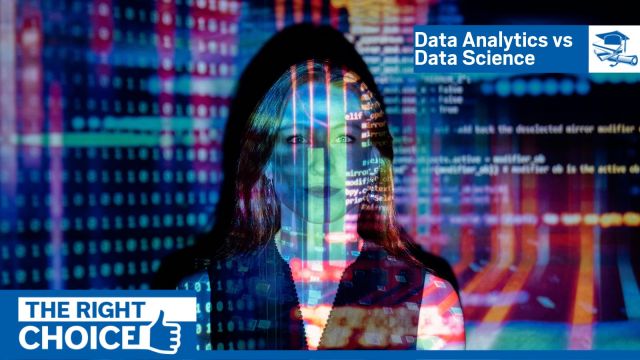Data Analytics vs Data Science: DA and DS rely on a core set of data-driven processes, such as collecting, cleaning and analysing data to extract insights. Professionals in both domains work to support business decision-making, although data scientists often contribute more to long-term innovation while analysts focus on immediate improvements.

The Right Choice: Their main differences lie in the scope, purpose, and methods used by professionals in each domain (Representative image/ pexels)
– B Ravindran and Krishnan Narayanan
Data Analytics (DA) and Data Science (DS) are often used interchangeably in casual conversations. Although they share a common foundation in working with data, they represent distinct fields.
Let me give you an analogy of photography and movie making to explain their differences simply. Data Analytics is like analysing a photograph of a scene – the picture is already captured, and you are simply interpreting what you see. DS, on the other hand, is like creating a film – you are not just capturing moments but crafting an entire narrative, with a plot that unfolds with predictions about how it will end.
Let us first start with their similarities. Both fields rely on a core set of data-driven processes, such as collecting, cleaning and analysing data to extract insights. Professionals in both domains work to support business decision-making, although data scientists often contribute more to long-term innovation while analysts focus on immediate improvements.
Moreover, there is some overlap in the tools used by both, such as Python, SQL, and data visualisation software, even though their specific applications differ. Lastly, both fields require an understanding of basic statistical methods, though data scientists delve deeper into advanced techniques like neural networks and clustering.
Their main differences lie in the scope, purpose, and methods used by professionals in each domain. Let us check here the differences:
Data Analytics vs Data Science: Differences in focus and goals
Data Analytics focuses on examining existing data to uncover insights and solve specific problems, usually with an immediate business goal in mind. The questions addressed often revolve around “What happened?” and “Why did it happen?”
Data Analytics vs Data Science: Differences in skill sets and tools
The skill sets required for each role are somewhat different. Data analysts typically need strong skills in querying languages (e.g., SQL), data visualization tools (e.g., Tableau, Power BI), and basic statistical techniques. Their job often involves cleaning and interpreting data, then presenting it in a way that stakeholders can easily understand and act upon. Data scientists, however, require deeper programming knowledge (e.g., Python, R), expertise in machine learning algorithms, and a strong background in statistics and mathematics.
They often work with large, complex datasets, experimenting with different models and methodologies to find optimal solutions.
Data Analytics vs Data Science: AI Factory
Researchers Iansiti and Lakhani, in Competing in the Age of AI, describe the AI Factory which brings DA and DS together in an iterative cycle. For example, in the AI Factory at a ride-hailing company like Uber or Ola, DA helps understand historical demand patterns (e.g., where and when ride requests spike). From this data, Data Science models predict future demand and optimize driver allocation in real time. Feedback from the real-world results of these predictions is continuously analysed, improving the models with every iteration.
Generative AI is significantly transforming Data Analytics and Data Science by automating data generation, enhancing model complexity, and enabling deeper insights. In Data Analytics, it helps create synthetic datasets that simulate real-world scenarios, allowing analysts to explore “what-if” situations and derive insights from incomplete or limited data. In Data Science, GenAI drives innovation by building advanced models that not only predict but also generate new data, improving the accuracy and adaptability of algorithms.
Data Analytics vs Data Science: Jobs in the market
How does this translate to the types of jobs and roles available in the market? Typical roles in DA include data analyst, business analyst, marketing analyst, and operations analyst. In these roles, professionals focus on understanding past performance to help businesses make better decisions. For example, a marketing analyst may study customer data to understand the effectiveness of a recent ad campaign and recommend improvements based on historical patterns.
A business analyst at a company like Flipkart might assess logistics data to identify inefficiencies in the supply chain and suggest strategies to improve delivery times. Common roles in DS include data scientist, machine learning engineer, AI specialist, and data engineer. These positions involve creating models and systems that can learn from data and make predictions.
For example, a data scientist at Netflix or Hotstar might develop an algorithm to recommend shows to users based on their viewing history. A machine learning engineer at a company like Tesla or Waymo might work on autonomous driving technologies, using vast datasets to train models that help vehicles make real-time decisions on the road.
The Wadhwani School of Data Science and AI at IIT Madras has many data scientists working on important technical and societal problems.
In summary, Data Analytics and Data Science are the keys to solving the world’s biggest challenges, from healthcare to climate change. Each field offers unique career opportunities, with data analysts driving immediate improvements in business efficiency, and data scientists pushing the boundaries of innovation through automation and prediction. Remember, if you unlock the power of data, you’ll unlock endless opportunities.
